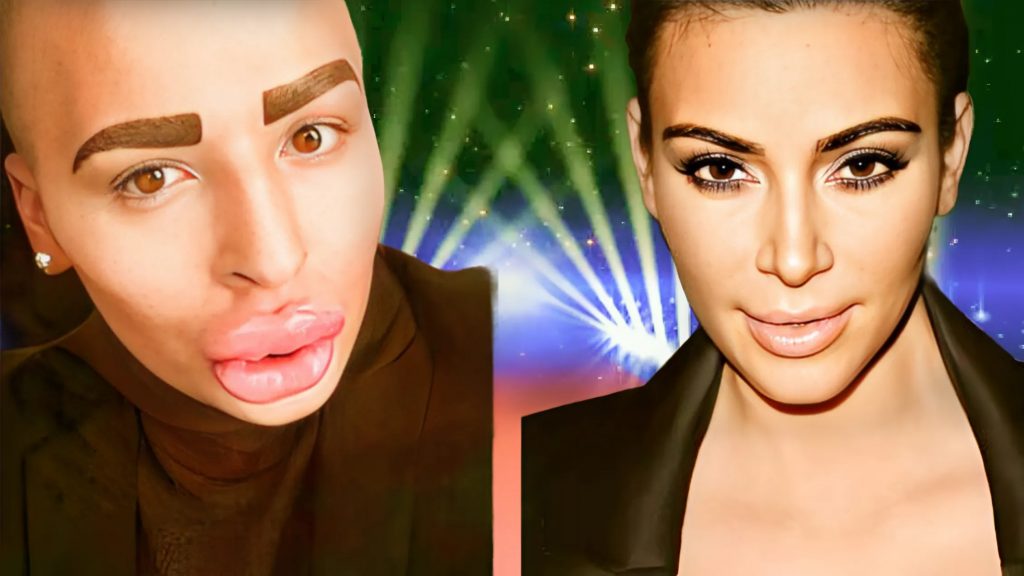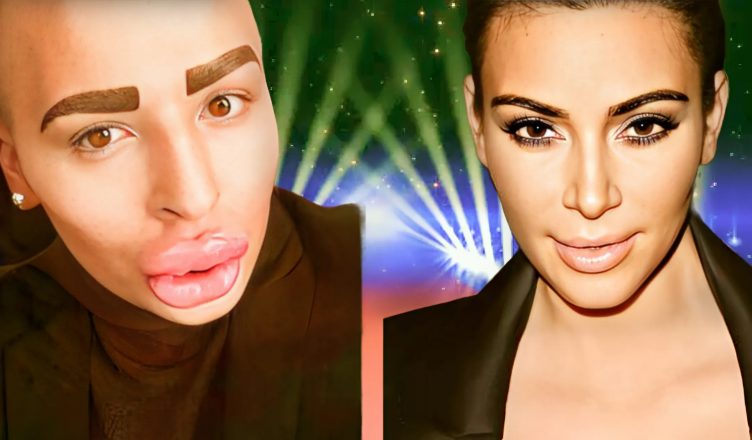Modern plastic surgery has reached a point where it can drastically transform a person’s appearance. Features once thought permanent—facial structure, body proportions, even skin texture—can now be reshaped with precision. But the story of Jordan James Parke from the United Kingdom is not just one of physical change. It is a story of obsession, identity, and the deep psychological currents driving one man’s desire to become someone else entirely.
From a young age, Jordan was captivated by the glamorous world of celebrities, luxury, and fashion. Among all the stars, one figure stood out above the rest: Kim Kardashian. To him, she represented the ultimate ideal of beauty, status, and influence.
He would spend hours watching Keeping Up with the Kardashians, flipping through glossy magazines, and analyzing every detail of Kim’s face, makeup, and wardrobe. What began as admiration eventually became an all-consuming goal.
«I don’t want to be myself. I want to be her,» Jordan confessed in an interview.
A $150,000 Transformation

To achieve his dream, Jordan spent over $150,000 on cosmetic procedures and surgeries. This wasn’t a matter of a few minor tweaks—it was a complete and deliberate transformation aimed at replicating Kim Kardashian’s look as closely as possible.
His extensive list of procedures includes multiple rhinoplasties, facial contouring with fillers, Botox injections, permanent makeup on his lips and eyebrows, and laser resurfacing treatments. Each procedure brought him closer to the ideal he was chasing, but further from the person he once was.
This wasn’t about self-improvement. It was about replacement. About erasing his own image to become a living version of someone else’s.
Where Does Identity End and Imitation Begin?
Jordan’s story raises critical questions about identity and self-worth. When does admiration become obsession? At what point does self-expression turn into self-erasure?
In today’s world, shaped by social media, celebrity culture, and unattainable beauty standards, it’s easy to lose oneself in the pursuit of perfection. Filters, photo editing, and influencer lifestyles create illusions of flawlessness. For individuals who struggle with self-esteem or identity, these illusions can become powerful traps.
Jordan is not alone. Around the world, more people are undergoing drastic transformations to look like celebrities, dolls, or fictional characters. Psychologists refer to this as a form of body dysmorphia or identity dysphoria—a disconnect between one’s internal self-image and their physical reality.
In such cases, the celebrity image becomes more than a role model—it becomes an escape route from the pain of being oneself.
The Illusion of Celebrity Perfection
The world of fame and celebrity is often presented as a dream life. But behind the flawless photos and red carpet appearances is an entire industry dedicated to maintaining an illusion. Stylists, makeup artists, cosmetic doctors, and digital editors all contribute to creating the image we see.
Celebrities like Kim Kardashian are very much aware of the brand they represent. They craft their public image, but they retain their personal identity beneath it. In contrast, Jordan tried to eliminate his own identity in the hope of becoming someone else entirely.
A Reflection of Our Times
Jordan James Parke’s story is more than a tabloid headline. It’s a reflection of the society we live in—a world increasingly obsessed with appearance, validation, and conformity to trending ideals.
We must ask ourselves: what are we promoting when someone feels they must become someone else to be seen, loved, or valued? What kind of culture are we cultivating when perfection is prized above authenticity?
There is nothing wrong with wanting to change aspects of yourself. Plastic surgery, when approached with care and self-awareness, can be empowering. But when change is driven by a desire to abandon who you are, it becomes a red flag for something deeper.
Conclusion
«I want to be her» is not just a dramatic quote. It is a cry for acceptance. A symbol of the internal struggle many people face in a world that often values image more than substance.
The true challenge in our era isn’t achieving external perfection. It’s learning to value our imperfections. Because no copy, no matter how exact, can ever match the worth of an original.
Instead of trying to become someone else, maybe it’s time to ask: how can I become the best version of me?
In a culture of comparison, authenticity is revolutionary. And learning to love yourself may be the boldest transformation of all.
